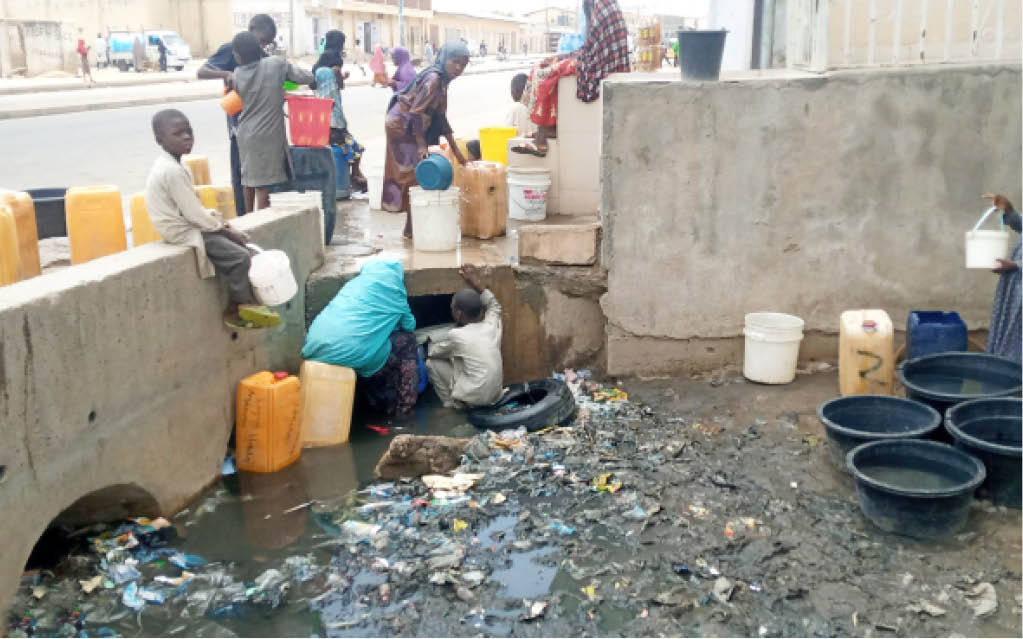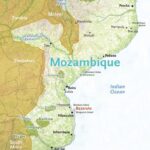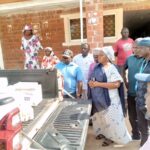Cholera, a deadly infectious bacteria disease, has swept through some villages in Bauchi and Gombe states like a whirlwind, leaving death and anguish in its wake in families that were hit by the epidemic.
Since the outbreak and wild spread of the disease in some villages in Bauchi, the death toll which earlier stood at 20 has risen to 50, while about 830 infections have been recorded across the state.
The situation in the state is at an alarming rate as it has not been brought under control according to the Executive Chairman, Bauchi State Primary Healthcare Development Agency, Dr Rilwanu Mohammed.
- Facebook slams two-year ban on Trump
Nigerians opt for Virtual Private Networks as FG suspends Twitter
The epidemic also struck scores of residents in Kalajanga Village in Akko Local Government Area Gombe and other communities in Garko Ward, killing a two-year-old child and six adults, while over 76 people who were hospitalized at the Bogo Model Primary Health Care Centre received treatment and had been discharged.
The Ministry of Health also disclosed that 28 deaths had been recorded from the cholera treatment centres, while the number of infected victims rises on daily basis, especially in Bauchi metropolis as well as Toro and Misau LGAs where the infection rate is very is high.
The Bauchi State Cholera Outbreak Situation Report 005 from the Ministry of Health indicates that identified risk factors in the outbreak include open defecation, poor environmental conditions, poor personal and food hygiene, inadequate safe water supply and leakages along pipelines due to ongoing expansion of metropolitan water supply.
When our correspondent visited the centralized cholera treatment centre at the Abubakar Tafawa Balewa University Teaching Hospital (ATBU-TH), he saw families of victims rushing them to the centre for treatment, while relatives of casualties recounted their ordeals as the situation.
A resident of Federal Low Cost Housing Estate and father of one the casualties, Aliyu Musa, who lost his 5-year-old child, Muhammad Aliyu, told Daily Trust Saturday that his wife and three children were infected at a marriage ceremony in Bauchi metropolis.
According to him, it was his youngest daughter that first got infected before two other children as well as their mother. But Muhammad died on Sunday evening.
Anisha Saidu, another resident of Kofar Ran area, who lost her sister, a widow and mother of seven, also died.
“My sister, Fatima, who visited us two weeks ago from Wase LGA in Plateau, died after a 4-hour of infection. She slept outside the room because of the extreme heat in Bauchi and woke up the next day, complaining of stomach ache. Later around 9.00 am, she started vomiting and purging. She was rushed to the hospital for treatment where the doctor later confirmed her dead,” she told Daily Trust Saturday.

“We were shocked by her condition because she did not show any symptom. When she started vomiting and purging, it was not more than four hours before she died. Her death threw us into mourning. She left behind seven orphans without anyone to cater for them because their father died two years ago,” she said.
In a chat with Daily Trust Saturday on the development at the Cholera Treatment Centre (ATBU-TH), Dr Rilwanu Mohammed, said: “The situation of cholera in Bauchi is not under control for now because we have had 200 inflow of new cases in our Cholera Treatment Centre in ATBU-TH. We already have 750 patients on ground and have recorded 28 deaths.”
He added: “We already have about eight tents accommodating males, females, children as well as recovery sites, toilet facilities and morgue. We are discussing with Doctors Without Borders working to expand the treatment centre because of the increase in patients. Very soon, another two tents will be erected to accommodate the increased number of patients.
“Already, the agency had dispatched five teams into Bauchi Town to educate people about cholera, its symptoms and what to do as well as decontaminating their wells.
“Two additional LGAs have also recorded new cases, bringing the total to 14 LGAs being infected because we had three new cases in Zaki LGA, four cases and one death in Bogoro LGA. We also got a report that there are 825 cases in Bauchi State and the number is increasing, while 28 deaths have been recorded. There are four deaths as I told you earlier which was not included because we didn’t see them and we don’t know whether it was cholera or not. In Toro LGA, we have 17 Wards in the general hospitals. Ten wards are now occupied by cholera patients, while in Misau LGA, three wards are being occupied by cholera patients,” Mohammed said.
Mohammed explained that there were three sources of cholera outbreak in Bauchi State. “First is open defecation because people are doing open defecation everywhere due to lack of adequate public toilet facilities. Already, we have notified the state government to partner private investors to tackle the menace through PPP as a part of urban renewal to have enough toilets facilities. The second source is fruits like mango and their likes that just come out before rain that is supposed to wash them and people are eating them without washing them properly.
“The third source of outbreak is broken pipes in some communities. Some of the pipes are obsolete because they were laid since Bauchi State was created. The current government’s project aimed at replacing them is more than 65 percent. They couldn’t get the pipes from abroad due to the COVID-19 pandemic, but now we heard that the consignment will soon arrive Bauchi.
“Some of water pipes have stayed for long, especially at Bakin-Kura area where people scoop water from breaking pipes at nights and the negative pressure Would force water from gutters to go in and the people will start using the water in the morning.
“We had the outbreak in 2016, 2017 and 2018 during the former administration and similar tents were setup in the same area in the hospital. When we came on board, we tried to put a machinery in place to prevent the repeat of cholera. A part of the strategies was to decontaminate 5,000 wells in the metropolis, but residents resisted the move due to of fish farming, insisting that it was the source of livelihood. But unfortunately, most of the residents that rejected the decontamination of their wells are the people having the cholera.
“In 2019, we wanted to decontaminate 5,000 houses but we decontaminated only 2,600 due to agitation by households,” he said.
Tsangaya schools affected
Tsangaya schools in Bauchi metropolis are also hit by the epidemic.
Sa’adu Akuyam, the head of the tsangaya school at Madina Quarters where 17 alamajirai were infected with one death, told Daily Trust Saturday: “I am at the isolation centre at ATBU-TH to see four of my students who were infected with the cholera. Also, there are four others at the Specialist Hospital Bauchi.
“Our major challenge is that while the infected ones were discharged from the hospital, another set of the alamajirai got infected. While I was in the hospital to take home the discharged patients, I was called that some other students were infected. As I am talking, a total of 17 alamajirai were infected with one death,” Akuyam said.
“I have 34 children under my care in the Tsangaya school at Madina Quarters. The condition is now under control because in about three days, there was no new case among my student. The only thing left is recuperation of the victims and out of 17 patients, only four are still in the hospital.
“The epidemic has taught me a hard lesson, particularly personal hygiene and environmental sanitation. We have already made arrangements to improve their accommodation, food and drinking water.”

Another head teacher at a Tsangaya school in Kofar Idi area in Bauchi, Dahiru Adamu Abdullahi, who was at the Cholera Treatment Centre said: “I am here to take home two alamajirai who were admitted for cholera infection. I had been called that they had recovered and been discharged. Only three members of the Tsangaya school were infected. The third one was controlled with oral ORS solution. Two defied the ORS and were rushed to the hospital for treatment.
“We traced the infection to one of their senior colleagues who received a clothes of a death victim of cholera in our neighborhood. The family of the deceased dashed the clothes to one of the Alamajiris in our school and being a senior student, he gave the junior ones to wash them for him. After washing the clothes, they got infected. It started with two alamajirai who washed the clothes. First, they started vomiting early in the morning and were given oral ORS solution but it was not successful,” Adamu said
He added that later the third victim followed but the ORS solution controlled his infection. The two others were rushed to the hospital when their conditions deteriorated with purging and fever.
“The one person who died in the neighborhood was not an almajiri but we believe the infected victims got the infection after washing the clothes. We have already disinfected the entire school and rooms to forestall further infection.”
Government swings into action
Dr Rilwanu Mohammed said that a memo had been written to the Commissioner of Education informing him about the outbreak and to transmit the information to all the schools, both government and private to educate them on the preventive measures and make provision for chlorine solution points at gates where they can wash their hands.
“Letters were also sent to all religious leaders, particularly imams and pastors informing them to commence awareness campaigns against cholera in their various sermons to enlighten their members about the epidemic. We have already started radio and television campaign programmes on cholera across the state,” he said.
“We have directed all the local government chairmen to setup cholera treatment centres and rapid response team which includes all the stakeholders needed in the team to collectively tackle the disease. Also, doctors without boarder have helped us setup the tents and we are working together and providing some items. I also brought 300 cartons of drips because some patients take between two to five cartons,” Mohammed added.
Seven dead in Kalajanga Village, Gombe
In the last 14 days, the epidemic has been ravaging some communities in Gombe. The death toll stands at seven, with one person still on admission at the Federal Teaching Hospital, Gombe.
Government had, penultimate Thursday, confirmed the death of seven persons and six other cholera victims receiving treatment at the Bogo treatment centre.
Auwal Shehu, a patient who is still receiving treatment at the hospital, said:
“At the beginning, it was only diarrhea, but after two days, I started vomiting watery substances. In the first day, I was going to the toilet alone, but on the second day, I had to be aided before I could even stand. After three days in that condition, my parents decided to bring me to this hospital where I was given intravenous fluids and some drugs. Now, I am feeling much better after taking the drugs.
Gombe State Commissioner for Health, Dr Habu Dahiru, said that the state government had stepped up measures to avert further spread of the disease.
He disclosed that the outbreak was confirmed by the ministry’s Rapid Response Team deployed to the affected communities who established a treatment centre at the Bogo Model PHC.

He added that within the last 14 days, 32 cases were treated and victims discharged.
Dr Dahiru added that he had activated a multi-sectoral Incident Management System for a prompt and coordinated response to the outbreak, with adequate resources for the management of cases and treatment.
When our correspondent visited Kalajanga village he met with parents of the affected victims.
Malam Abubakar Alhaji Kawu said that he lost his nephew to the disease after having diarrhea and vomited for three days without getting medical assistance.
“The boy and my son got infected. It started with stomach ache which turned to vomiting and diarrhea. Subsequently, he became dehydrated. We started with first aid at home by giving him ORS, but when his condition got out of our control, we alerted the authorities. Fortunately for us, he survived and was discharged from the hospital.”
But according to him, his nephew couldn’t survive as he died before he could get to the hospital.
About 20 residents of the village were infected and treated at the Bogo hospital and discharged.
Daily Trust Saturday learnt that the village with a population of over 1,500 are prone to cholera and other water-borne diseases because they depend largely on contaminated stream water from a valley at the outskirt of the village.
Emergency measures are needed to provide them with clean water to avert recurrence of infectious disease.
There is no single healthcare facility in the village, not even a patent medicine store. They depend solely on cattle-driven carts and motorcycles to take their sick and pregnant women to nearby primary health care centres in Liji, Kwadon or BCGA.
However, the state Water Board has assigned a tank to deliver water to the village once per day, which is not enough to cater for the large population.
Due to lack of access road, the tank stops near the valley which is about a kilometer from the village and then the children go there to evacuate the water in small containers to the village.
A resident of the village, Alhaji Buba Wayo, said that they had been neglected by successive military and civilian administrations since the state was created 25 years ago.
“Also, our only source of water is a borehole which is not functioning fully and the contaminated water at the valley on which we and our animals rely for domestic use,” Wayo said.

 Join Daily Trust WhatsApp Community For Quick Access To News and Happenings Around You.
Join Daily Trust WhatsApp Community For Quick Access To News and Happenings Around You.


